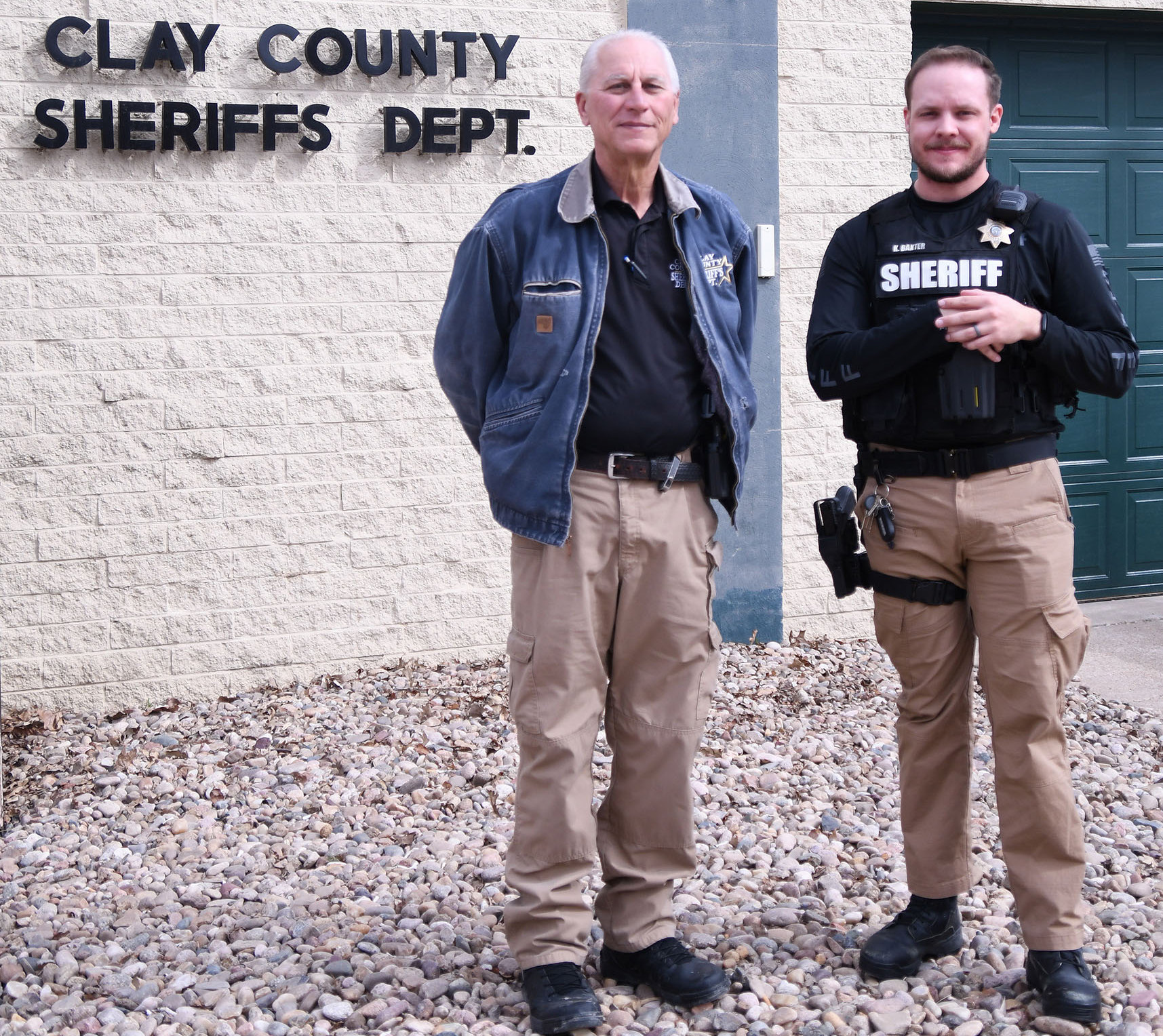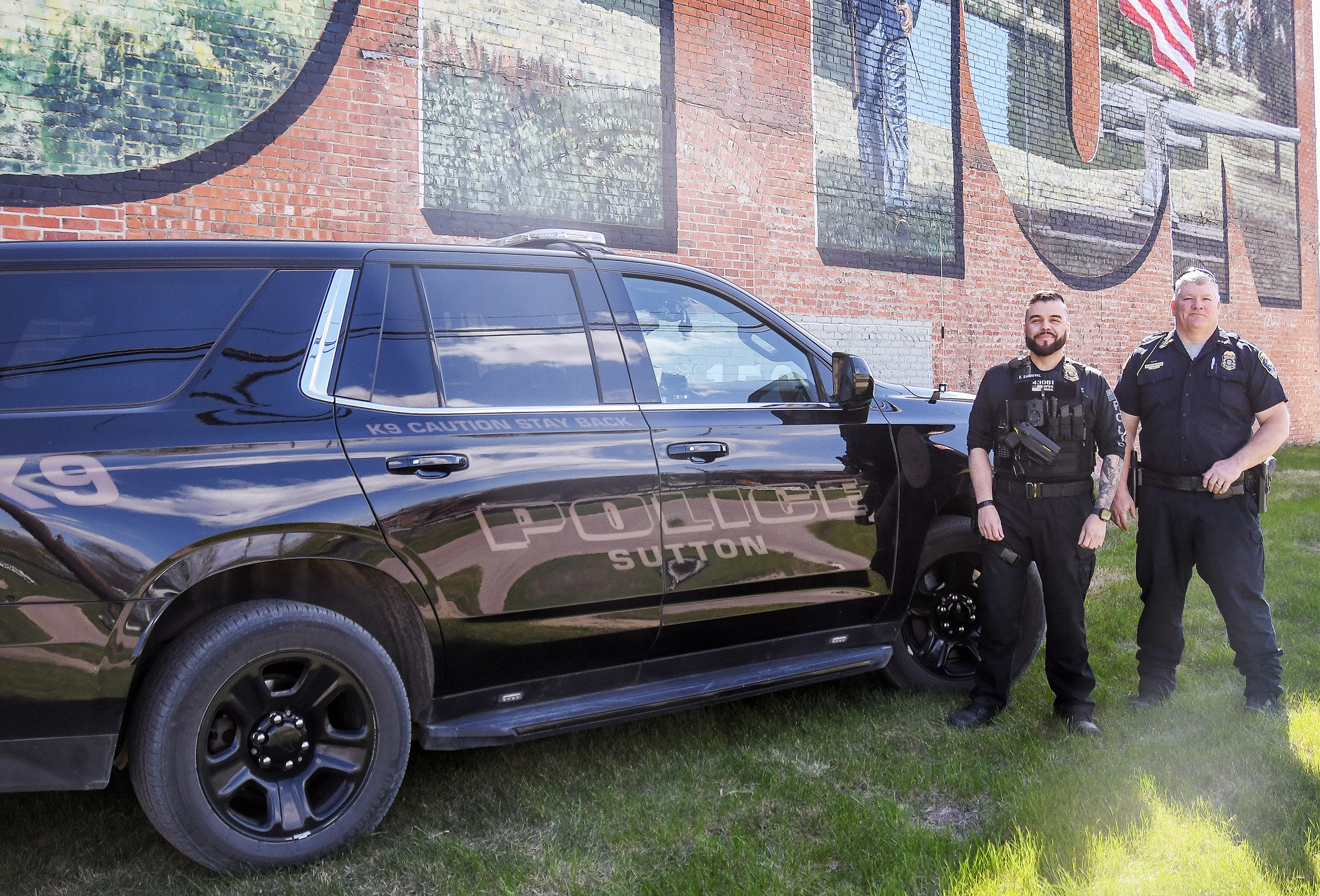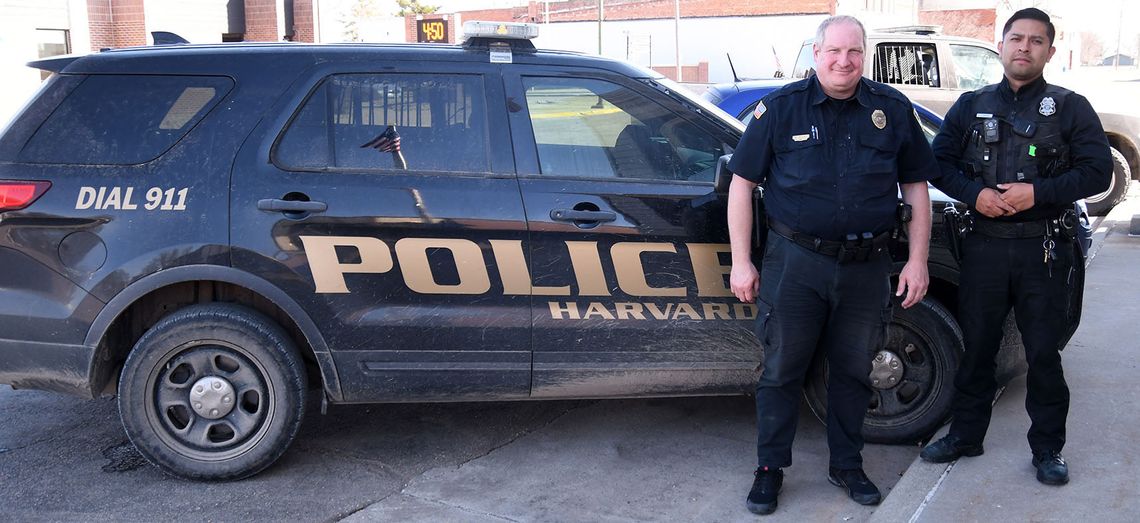* Editor’s Note: This is the first in a two- part series featuring local law enforcement and their takes on the field. Next week’s article will focus on technology, training, and why they stay.*
Over the past 10 years, law enforcement has changed. Whether it be technology advancements, how officers work with the public or simply additions to yearly training, those in law enforcement are constantly changing and adapting to a world where all eyes are on them.
As with most every job, being in law enforcement has its pros and cons.
A DROP IN LAW ENFORCEMENT As of mid-March, there were 55 law enforcement agencies in Nebraska with job postings.
Interest in law enforcement has significantly decreased, according to several officers in Clay County.
Clay County Sheriff Jeff Franklin said this is the worst drop in applicants he’s seen since the decline began about 16 years ago.
Franklin—in law enforcement for more than 40 years—said he noticed that a combination of a weak job market and a rigorous hiring process has made getting applicants difficult.
The Clay County Sheriff’s Office (CCSO) isn’t getting applications like they used to, having recently received five or six non-certified applicants in the last almost three months.
“There’s maybe two I’d feel comfortable putting through the academy,” CCSO Deputy Kreighton Baxter, who has been an officer for six years, said.
The trend in hiring has changed drastically, even from 10 years ago, they said.
“It’s a tough job, a tough sell. Tell them you’re going to be there for people on the worst days of their life, and maybe you’ll get bad guys in between, but it’s a tough sell,” Baxter said.
CCSO’s practices in hiring has also changed. Typically, they’d like to hire officers who currently live or are willing to live in the county, but in recent years they’ve relaxed on that because it’s helped get capable people on the department.
“Yeah, it’d be nice if they lived in the county, but that’s not the world we live in,” Baxter added.
Currently, there’s at least one county deputy and a local police department officer who reside outside the county.
Sutton Police Chief Tracey Landenberger, who’s been an officer since 1997 and Sutton’s chief since 2008, has also seen a drop in applicants, as he used to receive 20-30 applicants after posting a job. Now, with stricter requirements and a stricter physical test, he’s lucky to get three or four, and that’s months after posting.
“Before I got into law enforcement, I applied for the Kansas State Patrol—there were only 10 or 12 spots and there were hundreds of people who applied. Now, you can’t get hundreds of people to apply for that kind of job anymore,” Harvard Police Chief Wayne Alley said. Alley has been an officer since 2000.
Sutton Police Officer Edgar Sandoval, however, has a more positive outlook for the world of law enforcement. Sandoval, who’s been in law enforcement since 2018, said that he has noticed a shortage of officers in the last few years, but the state has put a lot of incentives in place to attract people to come into law enforcement.
“It’s finally starting to gain traction,” he said, adding that while there’s interest starting within the state, getting people to apply locally is still a battle.
“It’s hard to compete at a smaller level.”
CALLS TO SERVICE
The type of service calls changes in numbers each year, but this inconsistency keeps their jobs interesting.
Each officer has their favorite part of the job and least favorite, and many of those least favorite fall under the calls they respond to.
For Sandoval, the hardest part of his job are crimes that involve kids, not just with the initial response but making sure the kids are cared for and helped.
“You want to handle the situation correctly and help them, and take action so they grow up in a safe environment or take them out of a situation if it’s not.”
Landenberger noted how the hardest part of his job is dealing with domestics when someone’s been hurt, or having to be the person to tell someone their family members has died.
Baxter and Franklin agreed with that notion— notifying of a death.
A majority of officers talked to said domestic violence is one of the biggest issues in Clay County, as well as DUIs and drugs.
CCSO said the number of calls are going up each year, with 2024 seeing the biggest rise. In 2022, there were 1,056 calls; 2023 had 1,825; and 2024 had 2,109 calls come in. For the county, drugs and DUIs consist of most arrests, but domestic violence is a close second. “We’re more proactive now and making more traffic stops on vehicles and doing more arrests,” Baxter said. “We’re looking into how we can better serve the community and stop these issues... we’ve really come a long way for the better. We’re trying to be more transparent, trying to be open about what we’re doing, and being out in the community.”
Landenberger also said domestic violence and alcohol were the main issues he’s seen within the county, while Harvard PD said they’ve noticed a lot of disputes and traffic offenses, as well.
In Harvard, as there aren’t many long stretches of road, they don’t see many people speeding, as most of their stops involve drivers running stop signs.

All of the Clay County departments like to be proactive when serving their communities, instead of waiting for something to happen and then reacting.
Sandoval said his focus is on being proactive and visible. While traffic stops are not his main focus in terms of stopping crime, oftentimes, traffic stops have led to other possible crimes happening.
“Sometimes you have to be reactive, depending on the workload or even weather conditions,” he added.
Harvard PD’s roles center on engaging in the community, rather than always looking for crime.
“In a small town there’s only so much crime that can occur,” Gabriel said. “Part of being proactive is engaging with the community and asking if they’ve seen anything.
Keeping that presence in the community to help deter crime.”
He added how they have to find a fine balance in giving community members citations on very minor issues, while also upholding the law.
“If we’re seen by the community as givers of tickets and citations, we become disliked by the community. Then, if we need them to help us solve a more serious offense, they’re unwilling to assist us, Gabriel said.”
“You can’t just go out and hammer people over and over again. That’s not going to be very conducive to a happy community for law enforcement,” Alley added.
In terms of enforcing city ordinances, Alley said he doesn’t like to hammer on them, but if there’s a complaint and there’s obvious issues, he has to do his due diligence.
“We need to find a balance of being strict and proactive, and being friendly and being there in case they need something,” Gabriel added.
Many of Harvard’s calls center on dogs, domestic, disputes, disturbances, and assault cases.
“We used to have a lot of thefts and criminal mischief calls too, but as of recent, it’s been mostly disputes,” they said.
They also receive a lot of advice calls from people who are comfortable calling and asking them about an issue.
For Landenberger, administrative items are his main focus areas while on duty, but he also conducts traffic stops and, if needed, responding to calls that come in.
Many of Sutton’s calls center on city ordinances, loose dogs, and domestic violence, Landenberger said.
Baxter’s role as an officer also centers on administrative items, which have changed since he first started. This includes helping other deputies do their job to their fullest abilities; getting new technologies; and making sure different policies are in place.
However, as a department, CCSO also leans toward being more proactive than reactive.
“I do not like reactive law enforcement, I love proactive. Most of my most successful officers are always looking to stop crime from happening,” Franklin said.
Baxter added that the first step to achieving this is visibility.
“The taxpayers pay us to do a job and that job is to be out and about and be seen. Our deputies enjoy being out in our communities, and it’s not just doing traffic stops,” he said. “They like going to football games, stopping to play basketball with kids in Harvard...I want people to view our deputies as people. They’re members of the community, too, not just a badge.
I think it shows with our rapport within the communities and seems to continue to grow.”
MENTAL HEALTH & STRESS
Mental health has become a more commonplace call made to police in recent years.
These have included dealing with individuals going through mental illness issues or substance abuse, among other areas.
“Law enforcement has been given the added burden of trying to diagnose what people’s issues are, and getting them help in the form of resources,” Sandoval said.
According to Landenberger, these types of calls have changed how he handles situations and how he talks to people, all of which are dependent on who he’s dealing with.
From a county perspective, they’ve seen an increase in welfare checks on people going through a mental health crisis, or who made enough comments for someone to care and make a call for officers to check on them.
“I think the stigma on mental health is going away, and people are more apt to seek help,” Baxter said. “We’re trying to be helpful with people; our deputies would rather sit and talk with someone for hours than the alternative to happen.”
In prior years, mental health calls peaked in Harvard, but recently, they haven’t had many of those calls.
“Which is good; I hope those people are getting the help they need,” Harvard Officer Cristhian Gabriel, who’s been an officer since 2018, said.
When the calls do come in, they range from substance abuse, untreated diagnosis or someone just having a bad day.
Mental health is a focal point included in Harvard PD’s attempt to develop a separate budget for training.
“We’re trying to be more receptive to that stuff and learn about it and train to help members of the community that need help,” Gabriel added.
With the various types of calls and crime that can occur, an officer’s mental health can also take a toll.
Many officers noted that they do activities completely separate from law enforcement, creating a necessary boundary.
“Within this job, you have to compartmentalize on a lot of calls, because you can be dealing with a really difficult scene one minute, and then helping Aunt Susie unlock her car the next,” Baxter said. “And taking those emotions from call to call can be really burdensome on our deputies—on anyone, really.”
CCSO is a big believer in therapy and taking care of each deputy’s mental well-being.
When those difficult calls do come up, Baxter said Clay County Emergency Manager Haley Malone is great at setting up debriefs, which gives those involved a chance to talk about what they saw, interactions, and anything that might be bothering them.
Sutton officers take care by working out and relaxing at home.
“I go home and relax, take time to hunt, and have time to myself,” Landenberger said.
Sandoval added that he makes sure to engage in activities outside of law enforcement when off duty.
“It is important to disconnect and reset every oncein- a-while to keep level,” he said. “I keep going because I want to make sure people are receiving the help they need.”
Being small-town officers, however, can sometimes make it hard to step back from that role as law enforcement and just be themselves.
“Being the officer in the evenings, there’s no real way to get away from being an officer,” Gabriel said. “When I’m off-duty people still see me as an officer; they’ll come to my home or message my phone or my wife’s phone. So that can be stressful.”
He added that many people don’t see the Harvard Police Department as a single entity, but more as Officer Gabriel and Chief Alley.
“There’s no buffer. We are the face of the PD here,” he added. “It’s been very stressful in that sense, but it’s very rewarding. The people we are able to help, it’s nice to see them in the community over the course of the year, and they’ll still remember and thank us for what we did.”
Unfortunately, also being a small department means there’s not an officer on duty 24/7.
Alley noted how they wish they could help people at all times, but with only two officers, that’s not possible.
“We need to be able to balance our work and home life,” he said, adding, “I started seeing a therapist in 2002.” This was after he yelled at someone who was harassing him while Alley responded to a call.
“I knew then and there that something snapped in me and I needed help,” he said. “I started doing therapy on my own and still see that therapist to this day.”
Gabriel and Alley noted how their current administration hasn’t necessarily aided their stress levels, but never receive an extended hand to help when the stress becomes too much.
“It’s always a figure it out on your own and look for help on your own. It’s hard to please and balance everyone, it seems like,” they said.
Having been in law enforcement the longest, Franklin said he comes from the “rub some dirt in it” era, and has had to learn to work more with his officers on the mental health side of things, and keeping them as prosperous as possible.
Gabriel.





